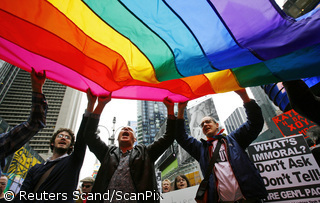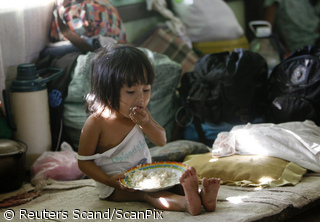Instances of racial violence and xenophobia are on the rise in Europe.
Published:
20 December 2001 y., Thursday
The European Monitoring Centre on Racism and Xenophobia (EUMC) came to this grave conclusion when it published its annual report for the year 2000.
"The worrying thing is that not just racist violence, but also racial discrimination is growing rapidly all over Europe", said Beate Winkler, Director of the EUMC on Tuesday in the European Parliament in Brussels as the report was made public.
Increasing racial violence, anti-Semitism and discrimination of people based on their skin colour and religion – the annual report makes note of this and points a finger in particular towards five EU heavyweights: Germany, France, Great Britain, Sweden and Spain.
In Germany, racist motivated crimes have soared by 33 percent as compared to last year. The news is worse for Great Britain – xenophobic acts there have doubled.
But the EUMC report makes clear that racial discrimination is not confined to a handful of singled-out European countries.
One of the reasons - the at times completely differing interpretations in countries of what amounts to a racist motivated crime. In many European countries, incidents of xenophobic attacks are seldom handled by the police as clear-cut racist crimes. That’s why one can’t automatically conclude that more racism exists in countries, which book a comparatively high number of xenophobic crimes.
The country with the most shocking track record of racist violence according to the report is Spain, where unprecedented brutal attacks on foreigners took place last year. The EUMC report makes particular mention of the Spanish village of El Ejido, where Spanish villagers assaulted and hounded Moroccan emigrants through the streets for four days.There has already been a marked increase in racist attacks on Muslims after September 11 –both verbal as well as physical.
Šaltinis:
dw-world.de
Copying, publishing, announcing any information from the News.lt portal without written permission of News.lt editorial office is prohibited.
The most popular articles
 Tiwonge Chimbalanga and Steven Monjeza are married, but in Malawi homosexuality is banned.
more »
Tiwonge Chimbalanga and Steven Monjeza are married, but in Malawi homosexuality is banned.
more »
 The World Bank today launched the fourth book in the critically acclaimed Moving Out of Poverty series, which provides bottom up perspectives on poverty and local realities by over 60,000 people living in 500 communities in 15 countries.
more »
The World Bank today launched the fourth book in the critically acclaimed Moving Out of Poverty series, which provides bottom up perspectives on poverty and local realities by over 60,000 people living in 500 communities in 15 countries.
more »
 Ten years ago, European leaders pledged to end poverty in the EU by 2010. As this deadline approaches, the goal is still some way off.
more »
Ten years ago, European leaders pledged to end poverty in the EU by 2010. As this deadline approaches, the goal is still some way off.
more »
 For many 2009 will be a historic year with the coming into force of the Lisbon Treaty, the outcome of the Copenhagen summit and the inauguration of the first black US president.
more »
For many 2009 will be a historic year with the coming into force of the Lisbon Treaty, the outcome of the Copenhagen summit and the inauguration of the first black US president.
more »
 Not answering the phone, celebrating Hogmanay and reading Dickens' Christmas Carol are just three seasonal traditions that MEPs shared with us.
more »
Not answering the phone, celebrating Hogmanay and reading Dickens' Christmas Carol are just three seasonal traditions that MEPs shared with us.
more »
 More and more people make their homes and own property in EU countries other than the one in which they hold citizenship.
more »
More and more people make their homes and own property in EU countries other than the one in which they hold citizenship.
more »
 European Parliament President Jerzy Buzek has made an televised Christmas and New Year address to European citizens, looking ahead to the challenges of the coming year.
more »
European Parliament President Jerzy Buzek has made an televised Christmas and New Year address to European citizens, looking ahead to the challenges of the coming year.
more »
 Lithuania takes the 1st position in the EU by the number of students in the country.
more »
Lithuania takes the 1st position in the EU by the number of students in the country.
more »
 Sergei Kovalev, former political prisoner turned activist for Russian human rights group Memorial gave an emotional and heartfelt address to the European Parliament on Wednesday 16 December.
more »
Sergei Kovalev, former political prisoner turned activist for Russian human rights group Memorial gave an emotional and heartfelt address to the European Parliament on Wednesday 16 December.
more »
 Strengthened passenger rights for travel by bus are an important item on the agenda when the Transport, Telecommunications and Energy Council (TTE) meets on 17–18 December.
more »
Strengthened passenger rights for travel by bus are an important item on the agenda when the Transport, Telecommunications and Energy Council (TTE) meets on 17–18 December.
more »